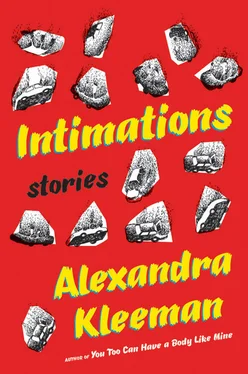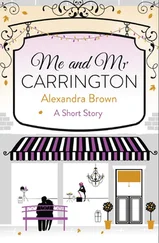“Are you going now?” she asked, not sure how his answer would affect her decision.
“If you’re ready,” he replied, looking her up and down as if for the first time.
Karen thought of the cold, tense bungalow, set behind the eerie pond and tree. “Okay,” she said, turning to grab her bag.
“Hold on,” he said, a little sternly. Karen froze. He pointed at the terrible pizza, still perfectly intact. “Don’t you want to get that boxed up?”
“Oh, right,” Karen said. She walked to the bar and asked for a box. She walked back to the table and began the process of shoving the terrible pizza into the too-small Styrofoam container. It fit: folded over twice, with a chunk of crust torn off.
“Great,” he said.
His name was EJ, and the vehicle he owned was an old motorbike painted construction-cone orange. The rattle of its worn-down motor clashed alarmingly with the deep, serene green of the jungle around them. When EJ slowed down to avoid potholes or clear a curve, the engine sputtered a deeply unwholesome gray smoke.
“I’m Karen,” Karen said, shouting into the rush of air.
“What?” EJ shouted. “I can’t hear you!”
The groves of palm trees and bananas were a broad smudge around them, as EJ made alarming decisions about when to barrel through piles of palm debris and when to swerve suddenly, wrenching around them. Absolute time and absolute speed were difficult to gauge on a motorbike, Karen thought as she tried to cling to EJ’s sweat-soaked back without digging her fingernails into the flesh, but it seemed as though they could die on this ride. In her left hand, she clutched the Styrofoam box packed with awful pizza: she would have dropped it, but it was still possible that EJ would turn the bike around and make them go back for it.
“Where is it?” she shouted.
“Soon!” he shouted back. “Can you try to sit still?” They were both visibly annoyed, and annoyed with the other person for showing it. Each time she shifted on her piece of the seat, EJ let out a grunt and made a big show of correcting for the wobble Karen had created as she struggled to rebalance herself.
“Stop wiggling around!” he shouted over his shoulder.
“What?” Karen shouted back.
Out of nowhere, EJ made a sharp left turn onto a dirt road. Gravel crackled beneath motorbike wheels as they barreled down the narrowing path. And then, abruptly, the ocean splayed out before them, gray-blue in the deteriorated light, more real and less pretty than the toothpaste water the resort was built to exploit. EJ dismounted and kicked his thong sandals off in the sand. “Holy shit,” he said, “glad that’s over!” He did a couple cursory stretches of his hamstrings and went into a downward dog. Now it was like Karen wasn’t even there: he pulled off his shirt and jogged toward the water with an easy stride. From time to time, she saw him punch at the air with his right fist in a gesture of triumph.
Karen walked slowly up to the water. She had no idea whether she was supposed to follow him in, but she didn’t care. EJ was only a fleck in the distance at this point, bobbing among waves. If she squinted her eyes into the shifting surface she could see the notion of his head or arm or leg as he swam around in the deeper water, among the cold currents or other such bullshit. She set the Styrofoam box down on the sand, dropped her tote bag. She slid off her sandals and piled some sand onto them, so they wouldn’t blow away: Dan had taught her to do this, last summer at Fort Tilden. She walked into the sea gingerly, step by step, the water lukewarm and smelling of brine and tar. Once when she was eighteen she had done something like this: she let an art professor from the college next to her own drive her in his car to a beach she didn’t even know the name of. He wore a black, full-body wetsuit; she had walked waist-deep into the waves fully clothed. As he dove and surfaced like a seal in the clear water, she had realized that she knew almost nothing about him. She had looked down at her skirt swirling around the dim, disappearing legs and hoped that she’d make it back to the car, back to town, to live free of mistakes like this one. And now, almost a decade later, she had made the exact same mistake.
Knee-deep in the surf, Karen willed herself to take another step, and another. She would move to Boston if she had to. She would get back to the bungalow, somehow, and she would say all of this to Dan: they had made the right decision, she was happy, she was ready to become even happier. Waist-deep in the warm gray water, she saw something wobbling beneath the surface. It was Styrofoam-white and resembled a piece of trash, suspended between the surface and the sand. She looked to her left, to her right. As she stared into the water, the floating shapes came into view all at once: like constellations they were there, venomous and drifting, more numerous than she could even have imagined.
In the summer between high school and college, Karen’s father was diagnosed with cancer. The cancer was malignant, but not incurable. Curing it would, however, involve a great deal of pain: the pain of incision, extraction, and then days of radiation battering the flesh invisibly. Her father underwent the course of treatment almost without comment, so that the only visible trace of its effect was his body lying on the couch for most of each day, silently watching baseball on a dizzyingly colorful TV screen. That summer, Karen stayed away from the house as much as possible. She walked for hours around their town and the banks of the creek, picking up pebbles and putting them in her pockets, emptying them out someplace different but equivalent. And when she came home for dinner she joined her parents in choosing not to speak about the cancer, though it wasn’t clear what else there was to speak about.
Even while it was happening, she sensed that she was living in disaster and failing to make herself adequate to the situation. What she wanted to say to her mother and father she couldn’t say, what she wanted to ignore she couldn’t ignore. After the remission, Karen promised herself that she would be ready for the next true disaster, she would identify it and react appropriately. She was haunted by the feeling that, even though her father had lived, she had let him die.
Since then, Karen had looked for disaster at every step in her life, but had discovered that each disaster she thought she had discovered was inadequate to the concept. This walk home, alone, on an unlit foreign road lined by deep, rock-filled gutters could end up being a true disaster — but it unfolded so slowly, so ponderously, and out there on the dangerous peaceful street the air smelled ecstatically of blooming plumeria. There were no clear signs to react to: peril was everywhere, intermingled with the mundane. Karen felt that all her life she would be moving from positions of perceived danger to positions of perceived safety without ever knowing which impressions were correct. And as she had this thought, her mood abruptly inverted: now she was feeling relief, joy, even something close to euphoria. Inhuman calls echoed through the vegetal thick; a siren went off far away.
On a road like this one, with no shoulder and no speed limit, any car that came along could hit her. If she was on the right road, she wouldn’t be back at the bungalow for hours. Poisonous animals lived in this area — snakes, scorpions, centipedes. The moon was large and bright overhead, and smooth like a stone. She didn’t know what she’d tell Dan when she got back to him, but she knew he’d be there, passed out on the bed with his laptop still open and his teeth unbrushed. He’d have fallen asleep believing she’d be back soon. On the table there’d be some cake or a cookie as an apology for whatever had happened by the pool that afternoon. And on her nightstand, there’d be a fresh glass of water.
Читать дальше












